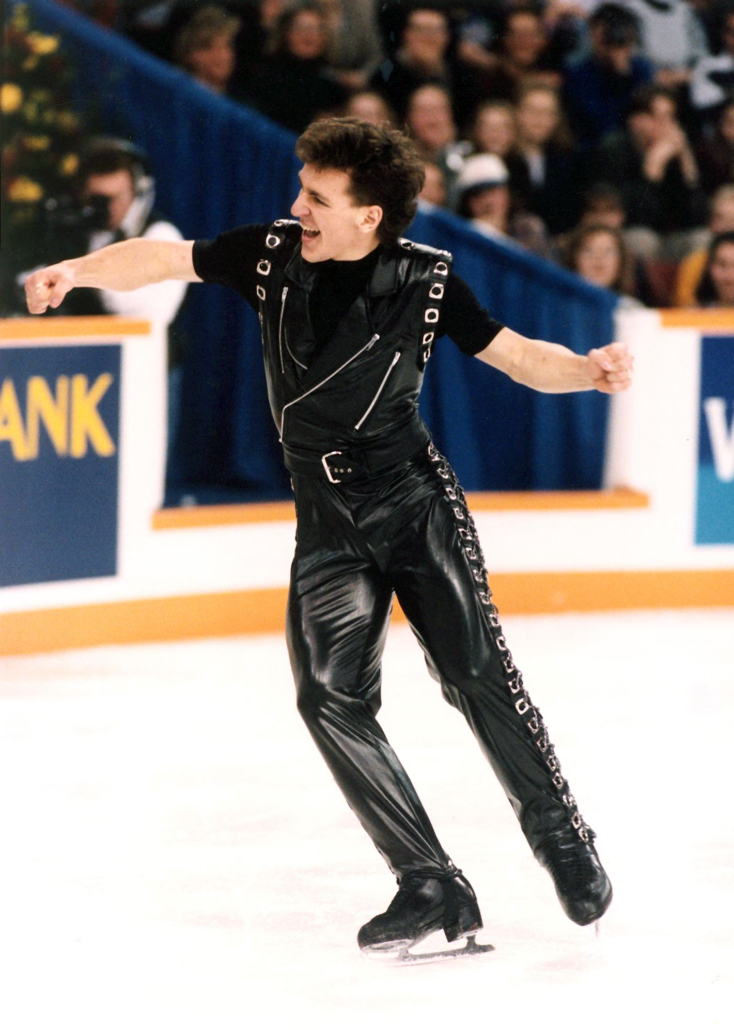welcome-home-blog-by-debbi-wilkes
By: Debbi Wilkes
World Champion Elvis Stojko fell in love with skating long before his feet were big enough to fit into a pair of skates.
Born in Newmarket and living with his family on a farm in Queensville just south of Lake Simcoe, he was 2 ½ years old when his parents were watching a skating competition on TV and Elvis proclaimed, “I want to do that!”

Photo Credit: Skate Canada
It took a few years for his folks to realize Elvis was serious, but finding a club back in those days took some research. Thanks to a neighbour’s excellent Intel, Elvis finally enrolled in the learn-to-skate program at the Newmarket Figure Skating Club.
“I took to it like a duck to water,” he says. “I was sliding around in my snow suit and helmet … all in … and trying all the things I’d seen on TV, especially spinning.”
From the first day Elvis stepped on the ice, if a coach gave him a challenge, he would work on it and work on it until it was mastered. “I was always relentless and I loved learning new things!” It didn’t take long for those early coaches to realize Elvis had something special.
By the time he was 5, he’d entered his first club competition against a slew of girls and a couple of other boys. “I didn’t have to skate a program or anything like that,” he admits. “It was mostly skating edges and doing the basics … and it was a surprise … I won! I still have that trophy with a girl skater in a pose … but it’s got my name on it.”
As the early years progressed, some people would comment on his talent. “I don’t know about talent,” Elvis chuckles. “I think I was just stubborn … not everything was easy.” Still, as he continued to test himself in many local competitions, his coach stepped in with the advice that if he really wanted to improve, he needed to be at a club with better skaters. The family started shopping.
He was 9 when the decision was made to go to what Elvis describes as the Mecca of skating, the Toronto Cricket Skating and Curling Club. It was daunting … and motivating … and with Coach Ellen Burka in charge, his life was about to change. Although he was only allowed to skate on the junior session, looking out at the senior session, he saw national and international champions everywhere!

Photo Credit: Skate Canada
To train there required a huge commitment from his family. As Elvis recalls, “I’d be up by 3:30 am and into a hot bath to warm up, then off with my Mom for the long morning drive to skate before school and then return back again after school.” The car became his dining room, his dressing room, his study room for homework, his rest area … and where he dreamed about the possibilities.
Things started happening fast at the Cricket Club. Within a couple of years Elvis went from a little kid who could do a single Axel to an athlete who could land two triples. He was also continually exposed to some of Canada’s greatest … Karen Preston, Gary Beacom, Marcus Christensen, Tracey Wainman … and even to Toller Cranston. “Watching them at that time was so motivating.” Elvis realized, “I started to understand what made them champions.”
As his independence grew and his coaching needs began to change, Elvis made the decision to move his training to Doug Leigh’s school and to a new team of coaches first in Orillia … an even longer drive … and then to Mariposa in Barrie. “Lots of scary snow days driving to train,” Elvis recalls. “My Mom was brave to get me there!” Most importantly it gave him the opportunity to skate alongside World Champion Brian Orser.
Doug’s school became Elvis’s workshop. “I’m putting my heart and soul into this,” he would feel. And as he continued to excel, his personal creed also became more defined. “I hated failing more than I loved succeeding,” he shares. And he admits that his anger was often a vital source for fuelling his progress. “If you don’t get mad when you fail, you don’t care enough.”

Photo Credit: Skate Canada
Looking back over his career, Elvis realizes that skating has also taught him many things off the ice … humility, acceptance, and the value of how to continue learning.
His number one piece of advice? “You have to love what you do.”
If you’re an aspiring competitor, he advises, “Ask yourself where you want to go? What is your ultimate goal?”
Then Elvis says, “Ask yourself an even harder question. What are you afraid of? Talent can only take you as far as your fears will let you.
“Once you answer those questions … getting there is up to you.”
Previous Post
Member Spotlight: Langton Skating ClubNever Miss an Update
Be the first to know about upcoming Skate Ontario events and special updates—subscribe today!
By submitting this form, you are consenting to receive marketing emails from: . You can revoke your consent to receive emails at any time by using the SafeUnsubscribe® link, found at the bottom of every email. Emails are serviced by Constant Contact


